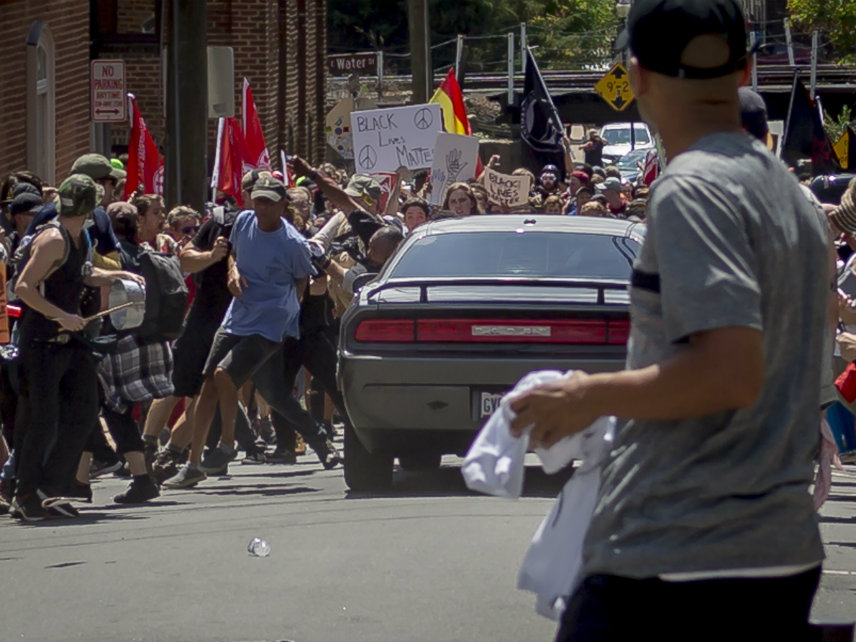Heather Heyer, Charlottesville, and the Awful Trajectory of Political Violence
Ultimately, individuals are responsible for their actions, no matter how heated the socialistic us-versus-them political rhetoric becomes.

Heather Heyer, a 32-year-old paralegal, has been identified as the woman killed Saturday when a car slammed into another vehicle and a group of pedestrians on streets crowded with protesters in Charlottesville, Virginia.
According to police, at least 20 people were injured in Saturday's attack, which appeared to be directed at a group of counter-protesters marching against the white supremacists, white nationalists, and Nazis gathered in Charlottesville over the weekend.
Video of the attack shows a silver Dodge Challenger being driven at high speed down a crowded street, sending pedestrians jumping out of the way. The car slammed into the rear of two other vehicles, sending cars and bodies flying. The driver of the car quickly reversed course, driving backwards up the same street. Police later found the car abandoned and arrested James Alex Fields, a 20-year-old Ohio man who attended the alt-right rally and appeared to march with a fascist group.
"The crash impact left Heyer lying on the pavement alongside another bloodied victim who was wearing a black shirt emblazoned with words of protest," the New York Daily News reported Sunday morning. The paper confirmed Heyer as the lone victim of the attack (two police officers died Saturday in a helicopter crash near Charlottesville that appears to be only tangentially related to the protests and violence), citing friends and relatives who identified her in-person and via social media, though police have yet to officially release her name. Friends have set-up a Go Fund Me account in Heyer's name to collect donations for her family.
It is fortunate there were not more casualties, but that does not lessen the tragedy of Heyer's death. Though there have been numerous clashes between pro-Trump, white nationalist forces and anti-Trump, anti-fascists in recent months, this is the first time someone has died during one of those (mostly peaceful) protests. It is a shocking event, but sadly not a wholly unexpected one, given the spiraling levels of dehumanizing rhetoric and political violence on display between the far right and far left, with each escalation being used to justify additional ones.
To be clear, Fields—or whomever was driving the car that careened down Charlottesville's Fourth Street on Saturday afternoon—is singularly responsible for the carnage he caused, and he should be held criminally accountable. He was charged with second degree murder, according to multiple media reports, and other charges are likely to follow.
Still, Charlottesville fits into a disturbing cycle. Beginning with protests at Donald Trump's campaign rallies last year, continuing through and beyond the inauguration the far left has met the violent rhetoric of the alt-right by glorifying political violence. The reaction has only reaffirmed and escalated the very fascist tendencies the left supposedly opposes.
As Robby Soave wrote shortly after alt-right ringleader Richard Spencer was punched in the face on Inauguration Day, "Striking Spencer isn't just morally wrong—it's tactically foolish."
Punching Nazis in the public square might make you feel good but it puts you a half-step closer to accepting that it's all right to run down the Nazi-punchers in the public square. What happened Saturday was not inevitable. I hope Heyer's death will generate a massive backlash against the alt-right. I hope it will cause the far-left to reconsider how they engage with fascists, white nationalists, and other enemies of freedom.
Maybe this is the event that brings an end to the rage and give both sides reason to explore the more effective option of non-violent civil resistance.
But I fear that isn't the case. I worry there will be violent reprisals and further escalation. If 2017 has taught us anything, it is that things can always get worse.
Reacting to events Saturday, Jeffrey Tucker concludes that the alt-right/anti-fascist conflict is really socialist-on-socialist violence. Both sides see their identities as collectives, rather than as individuals. That makes it easier, perhaps, for members to justify ever-increasing levels of violence against their opponents.
Ultimately, though, individuals are responsible for their actions. Saturday's tragedy should be a reminder to each of us to reconsider the dark places socialism—on the right and the left—can take us.


Show Comments (227)